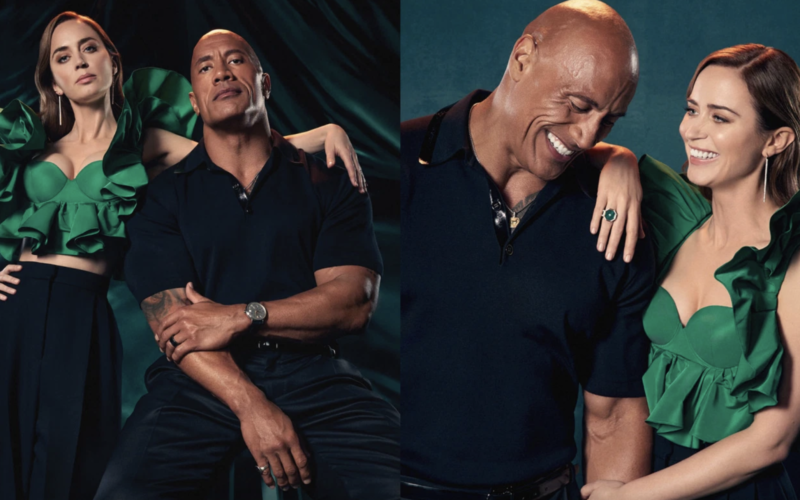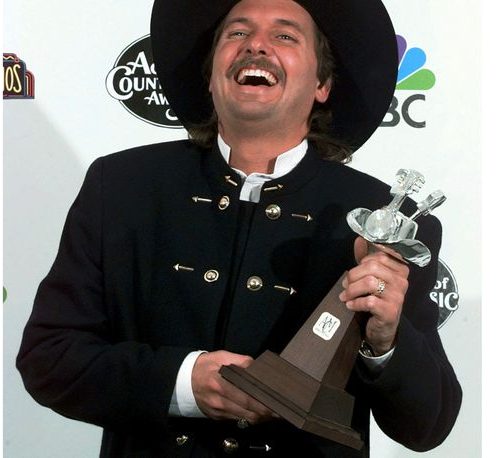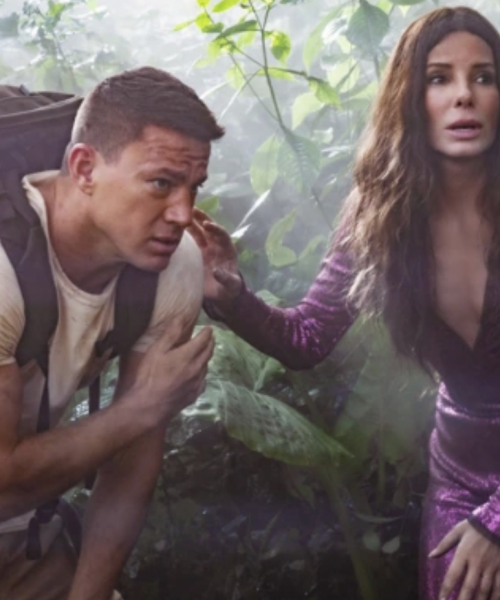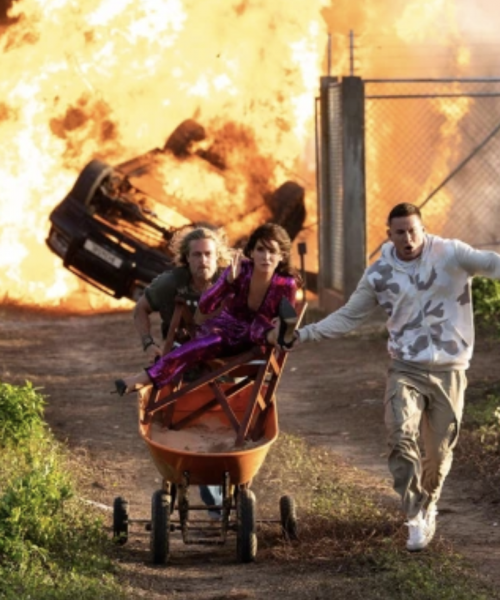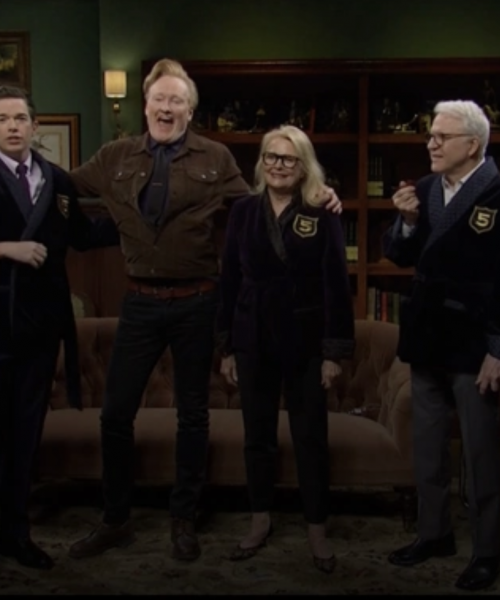BY REBECCA KEEGAN | HollywoodReporter.Com
Troy Warren for CNT
As they prepare to release their $200 million-plus Disney tentpole, the newly minted BFFs now lean on each other for career guidance: “I go to him for advice because he lived in the trenches.”
At about 4 a.m. in the fall of 2017, after a tiring night shoot on Universal’s Skyscraper, Dwayne Johnson, arguably the busiest person in Hollywood, set aside some time to film a video for Emily Blunt. At the time, he was attached to star in Jungle Cruise, which various producers had been trying to get off the ground at Disney since at least 2004, after the first Pirates of the Caribbean movie revealed the moneymaking potential of a theme park ride reimagined as a film franchise.
Johnson, who had been taken with Blunt since The Devil Wears Prada, felt she’d be his ideal sparring partner in the film, which was envisioned as a two-hander. “I had always admired her as an actor, but also when I would watch her on talk shows, she had this personality that was effervescent, that was cool and very, very charming.” So far Blunt was proving impervious to what producer Beau Flynn calls the filmmakers’ “unilateral targeted attack.” Looking to take a break after shooting Mary Poppins Returns and A Quiet Placeback-to-back, she had declined to read a script and remained unmoved even after receiving a heartfelt letter from Sean Bailey, the chief of Disney’s live-action studio.
So when Jungle Cruise‘s taciturn Spanish director, Jaume Collet-Serra, was planning to fly to New York to hand deliver a script directly to Blunt at her home in Brooklyn, Johnson wanted to send him along with the video as a kind of charm assist. “I must have shot it about five or six times because I had not communicated with Emily yet,” Johnson says. “I had not even met her. And I wanted to let her know via this video just how important she was to this movie and how I only wanted her in this movie. And it was great. And I … I actually never heard again from Emily. Didn’t respond at all. Just ghosted me.”
Says Blunt, with a smile: “I thought the video was sweet. Didn’t know you were going to be so sensitive.” Chalk up the misunderstanding to cultural differences — her British reserve versus his wrestling-ring-decibel enthusiasm. Eventually, spurred by Collet-Serra’s pitch that the film would be reminiscent of the Indiana Jones films and Romancing the Stone (and Johnson’s “sweet” video), Blunt did read the script and was won over, with the additional help of a generous payday.
Now the duo are on a soundstage in Atlanta in mid-July, where Johnson is in the final weeks of filming the Warner Bros. superhero movie Black Adam and Blunt has flown in from shooting a BBC/Amazon Western series in Spain to join him for Jungle Cruise press. The pair are seated in front of a lavish boat and jungle set, as crew around them arrange some prop shrubbery. With all the Disney promotional jazz hands deployed, this scene almost feels like the pre-pandemic movie business, save for the masks on the crew.

Brought together onscreen for their odd-couple appeal, offscreen the duo share a business savvy. As the film industry undergoes the most dramatic period of change in its more than 100-year history, battered by COVID and the rapid adoption of streaming, these two actors are navigating the moment with a shrewdness and an unusually hands-on approach to contracts, distribution and marketing. Where they differ is on their willingness to openly engage on such matters.
Periodically throughout the interview, Blunt seems to be trying to keep Johnson’s candor in check. When he starts to answer a question about their contracts, she’ll interject, “You’ll be quoted.” Some of this is a shtick they’ve adopted for the film’s promotion, but some is genuinely rooted in their DNA. As stars, Blunt, 38, and Johnson, 49, barely seem to hail from the same galaxy. “He said to me once, ‘I love that your debut was onstage with Dame Judi Dench and mine was in the wrestling ring cutting myself with razors,’ ” Blunt says.
This summer they’re bringing audiences a $200 million-plus, four-quadrant popcorn movie that would have seemed like an obvious profit engine for its studio in any other era. Instead, their movie, which will open in theaters and on Disney+ (for a $30 fee) on July 30, is the latest test of the moviegoing audience’s appetites a year and a half into the COVID-19 pandemic. Jungle Cruise is a family-oriented film coming out at a time when most children in the U.S. and around the world are not yet vaccinated and COVID cases once again are spiking globally because of new variants. Despite the health news, there have been some encouraging signs at the box office, most recently with Disney’s July 9 hybrid release of Black Widow, which debuted to a pandemic-era best of $158.8 million at the worldwide box office, plus another $60 million on Disney+. (Black Widow dropped a steep 67 percent at the box office in its second weekend, prompting the National Association of Theatre Owners to blame the studio’s simultaneous release strategy for a “stunning collapse.”)
“We all created our own space at home where we watched and consumed our movies,” Johnson says of how the pandemic changed the business. “We wondered, once we got back to the theatrical experience, are the majority of people now going, ‘You know what, I’m good. We’re going to watch it at home’? What we’re seeing now [at theaters] starting with A Quiet Place and Cruella, and then Fast & Furious and certainly with Black Widow … it’s invigorating.”

Johnson wants the theatrical business to bounce back for the sake of his studio partners, but his own viewing habits resemble the most couch-bound of consumers, since he has not been able to go to a movie without being instantly recognized and mobbed by fans since the 1990s. Blunt, meanwhile, goes to the theater incognito all the time. “I’m small, I blend in,” she says. “Put on a hat. It’s fun.” Where she’s a diehard for the theatrical experience, “I’m like, ‘Listen, Emily,’ ” Johnson says, lifting his iPhone. ” ‘Watch this movie. Turn it sideways. Look, we’ll watch this for two and a half hours.’ ”
The two brought those disparate perspectives into their meetings with Disney about how to release Jungle Cruise, with the studio ultimately deciding on the hybrid release strategy due to the slow pace of vaccine rollouts globally.
Johnson says that after finishing Jungle Cruise, he and Blunt continued to consult with each other about how to handle production during the pandemic and how to manage their deals — which often have been linked to box office — amid the changing release strategies. “We’re all trying to figure it out,” Johnson says. “Emily and I have had this conversation about how one thing will impact another, these dollars are dollars now and then down the line. It’s an important conversation for us to have.” Blunt says she has relied on him for counsel as she navigates the next stage of her career. “I really appreciate that DJ comes from struggle,” Blunt says. “He comes from some hard times, and he wears it very lightly and in a very wise philosophical sense. And so I do go to him for advice because he has lived in the trenches. He has not just winged it, and it has not been this meteoric rise to where he is now. It’s been a lot of razor blades and tears.”
Jungle Cruise, which is based on a 65-year-old riverboat cruise theme park ride, is no slam dunk. While 2003’s Pirates became a five-film box office juggernaut, that same year’s The Haunted Mansion was panned, and Disney’s most recent ride-inspired movie, Tomorrowland, flopped — even in the much more hospitable 2015 moviegoing environment — grossing just $209 million globally. Box office tracking has been less predictive during the pandemic, but some sources close to the film already are worried about Jungle Cruise, hopeful the Disney+ premium offering buttresses their numbers, like it did for Disney’s Cruella. As the studio did with Black Widow, in a rare display of transparency for the streaming era, it is expected to release the Disney+ numbers for Jungle Cruise publicly.
Over the years, Disney had dabbled with multiple versions of Jungle Cruise, including one starring Tom Hanks and Tim Allen. In 2015, producers John Davis and John Fox came up with an idea inspired by the origins of the ride, which itself was inspired by the 1951 Humphrey Bogart–Katharine Hepburn adventure film The African Queen. With Disney’s blessing, they brought the pitch for a contentious, evenly matched male-female duo making their way on a riverboat adventure to Johnson’s production company, Seven Bucks, and he signed on within two days. It would be more than two years before they signed the actress to play Hepburn to Johnson’s Bogey and several drafts before they landed on the shooting script, which has five credited writers (screenplay by Glenn Ficarra, John Requa and Michael Green, with additional story credits for Josh Goldstein and John Norville).

In the film, which is set in the early 20th century, Blunt plays Dr. Lily Houghton, a pants-wearing scientist who hires Johnson’s steamboat captain, Frank Wolff, to steer her down a jungle river in pursuit of the Tree of Life. When Blunt came aboard, she had copious script notes, much of them scraping away what she deemed unnecessary backstory for Lily. “She brought a great point out to us, which is, ‘How come a lot of male figures just get to be adventurers, or explorers?’ There’s no backstory in Indiana Jones. He’s just a badass archeologist,” says Flynn. In the film, Blunt often has the swashbuckling moments, while Johnson often supplies the comic relief. On the ride, a Disney castmember called a “skipper” delivers a dad-joke-laden narration for guests, a task Johnson delivers with aplomb in the film. “You needed an actor like DJ with the willingness to poke fun at himself and to be the butt of all the jokes,” Blunt says.
Along with the business, cultural attitudes have changed since the Pirates franchise launched, further complicating what once looked like a safe bet. As Jungle Cruise was being made, Disney’s Imagineers were updating the ride, including making changes to Indigenous characters that had been depicted as primitive and threatening. The movie subverts that imagery, in a plot twist that reveals the Indigenous characters are the ones getting the last laugh. “You’re trying to represent the spirit of the ride that is pierced into people’s nostalgic memory,” Blunt says. “But you want to do it sensitively. You want to make sure that everyone feels seen and heard in a way that’s really respectful.” There’s also a gay character and a fair amount of time given to Lily’s radical-for-her-era life choices — one of Frank’s nicknames for her is “pants.”
For a movie with ambitious action set pieces and CG characters, the Jungle Cruise set relied on an unusual amount of improv by its stars and supporting cast of Jack Whitehall, Jesse Plemons and Paul Giamatti. “In a normal [studio] movie, you would be like, ‘Oh, I don’t have time. Just give me what is the thing that’s going to work,’ ” says Collet-Serra, who has developed a reputation in Hollywood for delivering genre movies that are better than they ought to be, like the 2016 Blake Lively shark movie The Shallows, and multiple Liam Neeson thrillers. “But here, we tried to keep some of the scenes a little bit more visually loose to let them improv. There’s tons of footage. I could cut two other movies with different jokes completely because they gave me so much.”
When Disney tested the film, which was shot and almost completely finished before the pandemic, they found that what audiences wanted most, more than spectacle, was the scenes of repartee between the two leads. “Very early on, we learned that their chemistry was magic and that people really cared a lot more about them fighting, or this banter that they have, than what they were bantering about,” Collet-Serra says. “We had more plot. But at some point, people were like, ‘Yeah, yeah, yeah, that’s all nice, but give me more of them together.’ ” Johnson was present for multiple test screenings, according to Bailey. “Inevitably the first call I got the next morning was from Dwayne about what he thought about the preview, and what his takeaways were, and what the studio’s takeaways were.”
In early March 2020, Jungle Cruise seemed to be on track for a summer release. By then, Johnson was shooting Red Notice for Netflix in Atlanta and about to leave for some days of production in Italy, and Blunt was attending the premiere for A Quiet Place Part II in New York, which was supposed to open March 18. Plans for all three films would grind to a halt as the pandemic set in. By summer of that year, Johnson, his wife, Lauren, and their two daughters, now 5 and 3, tested positive for coronavirus. “It was very scary,” says Johnson, whose symptoms were mild. “I couldn’t control it because then the nanny took it home to her family. And then the housekeeper took it home to her family, and they were a little older there. And you don’t want to be the fire-starter that then causes all this bedlam and fear. But luckily we all got through it, thank God.” There were silver linings for a person whose work ethic was forged on the 300-night-a-year pro wrestling circuit. “I’m always going and going and going,” Johnson says. “It really forced me to stop and slow down.” The Hollywood pause also gave Johnson time to focus on something he’d long wanted to do: launch a tequila brand. In 2020, his Teremana became the fastest-growing brand in the history of spirits, selling roughly 400,000 cases in its first year of business.
Blunt, meanwhile, spent much of the early months of the pandemic in a house outside New York City with her husband, John Krasinski, and their daughters, 5 and 7. While Krasinski launched his Some Good Newsweb series, Blunt focused on home-schooling and keeping household spirits up as Paramount pushed the release date for A Quiet Place Part II five times. Blunt and Krasinski were adamant about preserving a theatrical release, even as Paramount sold off other big movies to streamers during the pandemic, including Coming 2 America and The Trial of the Chicago 7. Ultimately, Paramount released A Quiet Place Part II on May 28 in theaters, where it has grossed $285.6 million worldwide, before releasing it July 12 on Paramount+. Though the film had its theatrical release, its window was truncated from the pre-pandemic norm of 90 days, with far fewer than the remarkable 266 days the original film had spent in theaters, and Blunt and Krasinski sought to have their deals with Paramount restructured to accommodate for that difference. Asked how those talks had resolved, Blunt says: “We had a solely theatrical release. We were given a 45-day theatrical window. We got everything we wanted.”

One pandemic event movie from which Johnson is conspicuously absent is Universal’s F9: The Fast Saga, which has grossed $591.3 million since it opened in China in May. Johnson starred in the previous three films in the series, as well as the 2019 spinoff, Hobbs & Shaw, but is not scheduled to appear in any future Fast films. In a June Men’s Health interview promoting the latest movie, Vin Diesel implied that a much-publicized feud between him and Johnson actually was a technique he deployed to elicit a better acting performance from the former pro wrestler. “I could give a lot of tough love,” Diesel said. “Not Felliniesque, but I would do anything I’d have to do in order to get performances in anything I’m producing.”
When asked about Diesel’s comments, Johnson says, “I laughed and I laughed hard. I think everyone had a laugh at that. And I’ll leave it at that. And that I’ve wished them well. I wish them well on Fast 9. And I wish them the best of luck on Fast 10 and Fast 11 and the rest of the Fast & Furious movies they do that will be without me.” Blunt can’t resist extending the moment. “Just thank God he was there,” she says of Diesel. “Thank God. He carried you through that.” “Felliniesque,” Johnson says.
Johnson’s hardest role yet, he says, is the one he’s shooting now, in Black Adam, in which he plays the DC Comics antihero. “Black Adam has all the powers of Superman, but the difference is he is blessed with magic,” Johnson says. “And also, by a code of ethics in the world of superheroes, they don’t kill the bad guys, but Black Adam does. There were a lot of elements like that that made me feel this is a real opportunity here. I felt like everything that I had done in the past in terms of my career, all the movies that I had done over the decades, even the ones that didn’t do well, all led to this particular role.”
It was while Johnson was doing a press junket for the 2008 movie Get Smart that the seed of the idea to play Black Adam was planted. At the time, there were rumors about Johnson playing Shazam in a movie that never materialized (he would later executive produce the 2019 Warners movie Shazam!, starring Zachary Levi). After a journalist at the Get Smart junket suggested to Johnson that he play Black Adam instead, the idea interested him. “I was in a different point in my career,” Johnson says. “I couldn’t get things greenlit really. So I said, ‘It’s up to the fans.’ ” Fans loved the idea of Johnson in the role, which he ultimately started shooting with Collet-Serra again in the director’s chair, in Atlanta in April. “This is our shot at the superhero space,” says Hiram Garcia, president of production at Seven Bucks, Johnson’s former brother-in-law and a friend who has known the star for more than 25 years. “I’ve seen DJ in all versions of great shape, but the shape he got in for this movie. … He just takes it so seriously, the character, the physical approach and what he’s put into his training, his diet. To see him change his body in that way — he takes great pride in not needing a muscle suit.”

Just as Black Adam was beginning production in Atlanta, after having been delayed eight months by the pandemic, the Georgia legislature passed a sweeping new voting law that the Justice Department is challenging on the grounds that it denies Black Georgians their voting rights. Hollywood’s deep investment in production in the state came up for debate, and some producers decided to exit Georgia, including Will Smith and Anton Fuqua with their Apple movie, Emancipation. Others, like Ryan Coogler with Black Panther 2, remained. “Right as we were kicking off our production, that was going down,” Johnson says. “You start to feel pressure from a lot of different sides that you should stand up for something and you should leave if you don’t agree with the voting laws. I was adamant and clear that Black Adam was not going anywhere. We had committed to the state of Georgia and to the people here in Georgia. And this is a place that we had filmed multiple movies over the years. And when you commit to our hardworking locals and their families, the last thing you want to do is just pick up and move. So we weren’t going anywhere. We [the film’s producers] had the conversation. It was heated for about a week.”
Johnson, who in the past has said he would consider running for president, is comfortable weighing in on political issues, in contrast to Blunt. “I’m not quite American enough to say certain things,” Blunt says. “I appreciate how you navigate it because you’re very authentic and you stand by it. And you don’t just follow the crowd. You do step out and say certain things that might get you in hot water.”
Johnson, with 254 million followers, is the most followed American man on Instagram, where he shares workout routines and family moments and breaks news on his projects that once would have been revealed through studio press releases. “Coming from wrestling in front of 50 people at a used-car dealership or a flea market, the intention was always to have a relationship and a connection with [the fans],” Johnson says. “With social media, it was an opportunity for me to continue to connect with an audience where I didn’t have to rely on going on a talk show or this interview. It’s been the most invaluable decision of my career.” Blunt, meanwhile, has no social media profile. “I’ve always loved the mystique of an actor,” she says. “I don’t need to know what they brush their teeth with. I don’t want to know. I love people being hard to figure out.”
While Johnson sees Black Adam as the culmination of his career, Blunt is uninterested in comic book films. “I really understand that [superhero movies] are like a religion for a lot of people,” she says. “They don’t appeal to me in the same way. I don’t have this burning desire to play a superhero.” While Johnson has been shooting Black Adam, Blunt has been shooting a Western for the BBC called The English, which Amazon will release in the U.S. She plays an aristocratic woman who’s seeking revenge for her son’s death and befriends a Pawnee warrior. “It’s about love and revenge and race and history,” she says.
Despite their inauspicious start with a ghosting, Johnson has officially recruited Blunt into his orbit of regular collaborators, which also includes Ryan Reynolds and Kevin Hart. There is discussion of a Jungle Cruise sequel, and he has drafted Blunt to star in an as-yet-unannounced film project that he’s producing. “Not only is she a huge movie star but, more importantly, really the most empathetic human being I’ve ever met,” Johnson says as he is being pulled from the interview to get back to Black Adam. “God,” Blunt says, in mock mortification at his sincerity. “Get out of here.”
Blunt, who has been ribbing Johnson for much of the interview, turns serious to take stock of what she considers Johnson’s most extraordinary creation. “When you get to know him as being much gentler, much more shy than people realize, you really realize that The Rock is the performance of a lifetime,” she says. “It is so the antithesis of who he is. And so I’m going to push him to play, to take big swings with characters. Because it’s really transformative if you know him as I do and then you see him be The Rock — you’re like, ‘Who is that?’ “

In Other NEWS


























